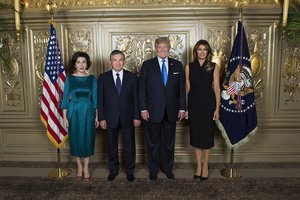WASHINGTON — President Trump welcomed President Shavkat Mirziyoyev of Uzbekistan to the White House on Wednesday, calling the visit a “great honor” as he worked to begin what aides described as a new era of partnership with a country that is making its first fitful turns away from authoritarianism.
Senior administration officials had said Mr. Trump planned to prod Mr. Mirziyoyev on lingering issues of human rights and press freedom during their meeting, but in public on Wednesday there was no hint of criticism or question in his remarks.
“He’s a highly respected man in his country,” Mr. Trump said of Mr. Mirziyoyev as the two sat in the Oval Office. “We’ve been working very closely together on different things, including trade.”
Mr. Trump has rarely brought up human rights concerns either in public or in private during his face-to-face encounters with foreign leaders — a break with past American presidents of both parties who routinely raised the issue — even when his aides have said he planned to. He and his advisers view the issue as an impediment to trade and a barrier to warmer relations between the United States and potential strategic partners.
In the case of Uzbekistan, administration officials said Mr. Trump wanted to forge an early alliance with a former Soviet state in a strategically vital location north of Afghanistan in order to encourage its recent movestoward greater political and economic openness. They said the United States had a window of opportunity to push Uzbekistan — a rare bright spot of change in a region rife with repression — toward greater progress and closer cooperation with the United States.
And while Mr. Trump’s advisers concede that Uzbekistan still has a long way to go in improving its human rights record, they have privately praised Mr. Mirziyoyev for releasing some political prisoners, eliminating systematic child labor and loosening controls on the press. The changes are part of what some observers have called an Uzbek Spring, following the death in 2016 of the country’s iron-fisted leader, Islam Karimov.
Mr. Mirziyoyev, speaking through a translator, repeatedly called his visit to the White House “historical,” and said he and Mr. Trump had drawn their two countries closer together.
“Our relations since the elections of the president of the United States of America as well as the president of Uzbekistan have risen to a new level,” Mr. Mirziyoyev said. He also praised Mr. Trump’s economic record effusively, saying that he had achieved “very outstanding results” in cutting taxes and creating jobs.
“I agree 100 percent,” Mr. Trump interjected, grinning.
On Tuesday before Mr. Mirziyoyev arrived in Washington, Uzbekistan and American companies signed 20 business deals worth $4.8 billion.
“They’ve actually made investments here; we make investments there,” Mr. Trump said. “We’re working together from the standpoint of the military, including his purchase of equipment and military equipment from the United States.”
In the run-up to Mr. Mirziyoyev’s visit, Uzbekistan last week released Bobomurod Abdullaev, a freelance journalist who was detained and imprisoned in September by Uzbekistan’s feared National Security Service. Mr. Abdullaev’s wife and lawyer have said he was tortured, and he was charged with “conspiracy to overthrow the constitutional regime.”
Three days after Mr. Abdullaev’s release, the White House announced that Mr. Mirziyoyev would be coming to the White House for a “historic” meeting with Mr. Trump. This week, administration officials also said they counted it as a good sign that Uzbekistan granted credentials to Voice of America, a United States-government news outlet. But the Uzbek government is still tightly restricting press access; on Monday, it denied a visa to a New York Times reporter who had been invited by the Nukus Museum, which houses an important collection of Russian art.
American officials said the administration would push the Uzbek government during the visit to drop restrictions on the right of religious groups to assemble, a point they said would be pressed by Sam Brownback, the American ambassador at large for international religious freedom.
Human rights groups see the visit as an opportunity for the Trump administration and Congress to pressure Uzbekistan to release thousands more political prisoners and overhaul its laws and legal system, scrapping charges of “extremism” that have been used to punish dissenters.
“We are heartened to see the release of long-held activists,” Nadejda Atayeva, president of the Association for Human Rights in Central Asia, said in a statement released by a dozen human rights groups in advance of the visit. “To ensure lasting change, the repressive legal framework used to persecute and imprison peaceful activists and religious believers on ill-defined charges of extremism for so many years should be changed for good.”









